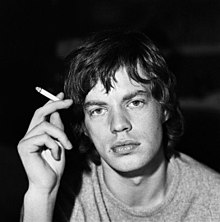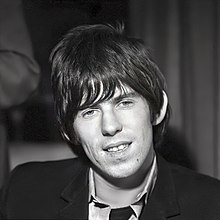Tom Keylock

Thomas "Tom" Keylock (born August 9, 1926 in London ; † July 2, 2009 ibid ) was a British chauffeur and transport company who worked as a road manager for the Rolling Stones from the mid-1960s to the early 1970s .
Live and act
Keylock joined the Royal Army Service Corps , a major British Army unit responsible for transportation . During the Second World War he took part in the Battle of Arnhem in the Netherlands in 1944 . At the end of the war, he was transferred to Palestine when Britain wanted to end the League of Nations mandate for Palestine and planned to withdraw from the region. After Keylock was discharged from the military, he worked as a driver in and around London.
In August 1965, Keylock was hired by the Rolling Stones management to take Mick Jagger and Keith Richards to Heathrow Airport . Since he was able to successfully shield the two band members from fans and photographers, they offered him to work for them full-time. After a month to think about it, Keylock accepted the offer.
Keylock acted as driver and bodyguard and developed sophisticated methods to secretly take the band to hotels and venues and pick them up from there undetected using decoys and unexpected routes. As a result, he soon became a significant person in the area of the Rolling Stones. Occasionally he also cooked for the group. In May 1966, Keylock was also the driver for Bob Dylan on his controversial Electric tour of Great Britain.
In March 1967 he was chauffeuring Keith Richards with Brian Jones and his girlfriend at the time Anita Pallenberg on their way to Morocco through France when the sick Jones had to be brought to a hospital in Toulouse . With Keylock at the wheel, Pallenberg and Richards continued their journey through Spain to Morocco and became a couple. When Jones returned to them in Marrakech and saw the new arrangement, he lost his temper and hit Pallenberg, to the horror of Keylock. He then developed a ruse that enabled Richards and Pallenberg to leave without being noticed by Jones. Then Keylock left Morocco and Brian Jones was left alone.
In June 1967 he took Jagger and Richards to court in Chichester Magistrates Court after police seized various substances in the Redlands country house of Richards in Sussex in February 1967 and charged them with drug offenses. At first both were sentenced. An appeals court later overturned Richards' sentence and suspended Jagger's sentence.
In October 1967, Keylock accompanied Brian Jones and his friend Stash de Rola to a trial for drug possession after Scotland Yard searched Brian Jones's apartment on Courtfield Road in London in May 1967 and arrested the two people present. De Rola was acquitted , while Brian Jones was sentenced to imprisonment , which was later suspended.
In March 1968, Keylock Jagger drove to a demonstration against the Vietnam War in front of the US Embassy in London's Grosvenor Square , which turned into a street battle . This demonstration inspired Jagger to compose Street Fighting Man . In September 1968, Brian Jones was tried again for drug possession. His girlfriend at the time, Suki Potier and Tom Keylock, accompanied him to the trial. This time again, Jones escaped imprisonment.
After the band split from Brian Jones in June 1969, Keylock was asked to keep an eye on the musician, who had retired to Cotchford Farm in Hartfield , Sussex, and lived there with his new friend Anna Wohlin . Keylock had recommended Jones to hire the building contractor Frank Thorogood for the planned renovation work. Thorogood was also present on the evening of July 2, 1969, when Brian Jones was killed in the property's swimming pool. Before that, Jones and Thorogood had bathed in the swimming pool together. Keylock also came to the scene of the accident after Thorogood had informed him by phone.
That night Keylock let the remaining Rolling Stones band members know that their former bandmate had died while rehearsing with their new guitarist Mick Taylor at Olympic Studios in London. Keylock also apparently made sure that Jones' country house was cleared and that Anna Wohlin, the musician's last friend, left the country within a few days and returned to Sweden.
Keylock was also in attendance when the Rolling Stones gave a free concert in London's Hyde Park on July 5, 1969 , which was rededicated at short notice to a memorial service for Brian Jones. Keylock helped to fly hundreds of white butterflies off the stage in memory of the late musician. Five days later, he also organized Jones' funeral in Cheltenham . Because of the elaborate arrangement and the ornate bronze coffin Keylock had obtained, there were differences of opinion with Lewis Jones, the musician's father.
When the Rolling Stones moved to France on the Côte d'Azur for tax reasons in 1971 , Keylock's services were no longer used. Keylock then turned back to his own transport company. In the eighties he secured another prestigious engagement when he worked for the English national football team .
In 1994 Keylock made grave allegations against Frank Thorogood regarding the cause of Brian Jones' death. He claimed Thorogood confessed on his deathbed in 1993 for causing the death of Brian Jones. Jones' death had been classified as an accident in the 1960s . The official cause of death at the time was death by drowning under the influence of alcohol and other drugs .
In 2005 British film producer Stephen Woolley brought out the biopic Stoned about the life of Brian Jones. Keylock acted as a consultant and was portrayed in the film by David Morrissey . In this biography, the death of Jones is also portrayed as a result of Thorogood's assaults. As part of the film's release, Keylock gave several interviews in which he repeated his allegations from the 1990s and blamed Thorogood for the death of Brian Jones.
Anna Wohlin, Jones' last girlfriend, is also convinced that Jones did not die of natural causes. However, Wohlin assumes that Thorogood drowned the musician without intent to kill, perhaps in the course of a scuffle. The relationship between the two men was strained at the time due to construction work on Cotchford Farm and outstanding bills. Between 2009 and 2010, the police re-examined the circumstances of the death, but found no reliable evidence that would warrant further investigation.
Tom Keylock died in 2009 at the age of 82. He was married and had four daughters.
Web links
- The Independent : Tom Keylock: Rolling Stones fixer from the 1960s
- Daily Mirror : New evidence in Rolling Stone Brian Jones murder cover up emerges 50 years on
- Frankfurter Allgemeine : Brian Jones case: "I did that to Brian"
- Internet Movie Database : Tom Keylock
| personal data | |
|---|---|
| SURNAME | Keylock, Tom |
| ALTERNATIVE NAMES | Keylock, Thomas |
| BRIEF DESCRIPTION | British chauffeur and haulier |
| DATE OF BIRTH | August 9, 1926 |
| PLACE OF BIRTH | London |
| DATE OF DEATH | July 2, 2009 |
| Place of death | London |


